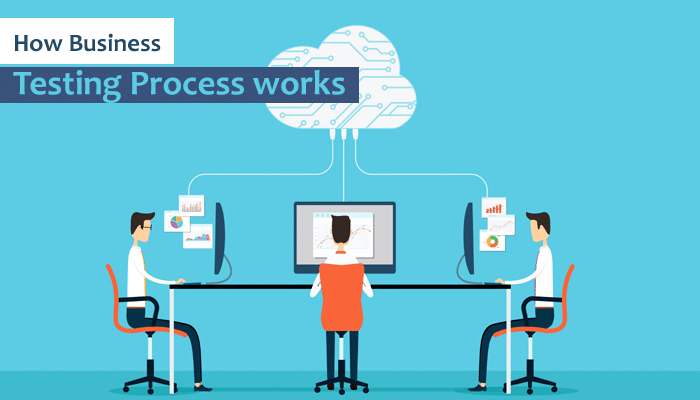In an increasingly competitive world, businesses need to deliver exceptional customer service to maintain their competitive edge. Since providing this superior customer experience is linked directly to the quality of your products and processes, it all depends on effective and efficient business testing process.
Business Process Testing(BPT) is a role-based testing method that facilitates testers and SMEs (Subject Matter Experts) to work together. The emphasis of BPT is not on checking any specific vertical. Rather, it tests your entire system – from finding hot leads and driving them down the sales funnel to streamlining service delivery and deployment, together with efficient vendor management, revenue management, and problem-solving methods.
This comprehensive end-to-end testing focuses on key business parameters. With it, you can check the readiness of your products and processes from the business side while also experiencing it from the customer’s perspective.
Lock, Stock, and Barrel for Business Process Testing
Upgrading and launching new applications and processes is a continuous act in organizations today. At times, the focus is inward – to generate greater operational efficiency. At others, the focus is outward – on customers and competition. In both these cases, the common need is to test applications and processes in the shortest possible time, straining minimum resources and implementing them sooner, thus allowing businesses to reap the rewards.
However, this puts a lot of pressure on the testing and QA teams as they have to meet tight deadlines and budgetary constraints. That’s why the emphasis has shifted from manual to agile methodologies.
BPT isn’t just about testing any or a few specific applications. Rather, it’s about testing the unique, complex business processes that support your company’s strategy. That’s why you need end-to-end system integration testing. Whether you want to maintain your status as an industry leader or plan to boost your competitive edge, BPT testing will let you increase reliability and quality, thus bringing down the time to market a product, which guarantees a positive customer experience.
1. Customer Acquisition:
This is a major priority for businesses. No wonder companies automate the process with apps that help them track opportunities and orders, manage leads and territories, or maintain customer data. Business process testing at this stage helps validate the proper execution of critical processes. Proper execution and reliable quality assurance across these processes would help companies improve staff efficiency, accelerate IT projects, and steer clear of business disruption.
2. Service Deployment and Service Delivery:
Deployment and delivery of service are crucial for business reliability and reputation. That’s why automated, comprehensive testing is needed. Otherwise, high rates of defects can leak into production systems and processes, which would significantly impact quality/test team productivity, spike release costs, and cause consequent business losses.
3. Billing and Revenue Management:
Businesses today are no longer limited by geographical barriers. With company branches spread across states, often all over the world, aided by an increasingly mobile workforce, organizations today often struggle to deal with multiple billing and pricing solutions across lines of business, geographies, and branches. That’s why automated Revenue management (RM) software are used as tool to supply analysts with formatted and summarized data who use it for their decisions (such as for allocating capacity for the price point, or fixing a price etc).
Such tools also help to automate various other processes completely such as invoice generation, payment collections, etc. They can even play a deeper role such as in fit/gap analysis, validation documentation, etc. That’s why testing to validate these tools is required to check if they help improve RM and if they do, to what extent as compared to a precious/alternate model.
Multi-vendor/partner management to achieve zero defect leakage in UAT (User Acceptance Testing), Production, and customer problem management (problem analysis, identification of the cause, steps taken to resolve the problem, etc. ) are also under the purview of BPT.
Why Perform Regression Tests?
Business processes have several interrelated elements. Even a small, seemingly insignificant change to an application or process can ripple outward in surprising ways, breaking functions that otherwise seem completely unrelated to the new alteration. By running regression tests and maintaining the test bed, you can ensure that your alteration not only behaves as you want it to but also hasn’t accidentally caused problems in functions that had otherwise worked properly when tested earlier.
Tools for Business Process Testing
HP Business Process Testing Tool:
For automated testing using HP Business Process Testing, the tools are available at the HP Quality Centre, which efficiently manages the real-time KPI’s. This tool for functional and regression test automation amalgamates with HP Quick test Professional for all software and environments, HP WinRunner for entire enterprises and ERP and CRM-related solutions, and integrates with TurnKey Quality Accelerators.
Red Hat JBoss BPM Suite:
This tool is appropriate to automate, manage, and monitor business processes and policies. It holds its forte in Business Activity Monitoring which is done via the creation of real-time dashboards for KPI’s.
Test Rail:
It is a tool for flexible project organization, the latest version being Test Rail 5.1 appropriate for incredibly productive testing. This tool is designed for defect management and works by assimilating with other issue-tracking tools for excellent results. We can fully integrate with JIRA, FogBugz, Redmine, Bugzilla, and 35 other tools to provide a wide spectrum of testing coverage at any stage of the business process.



